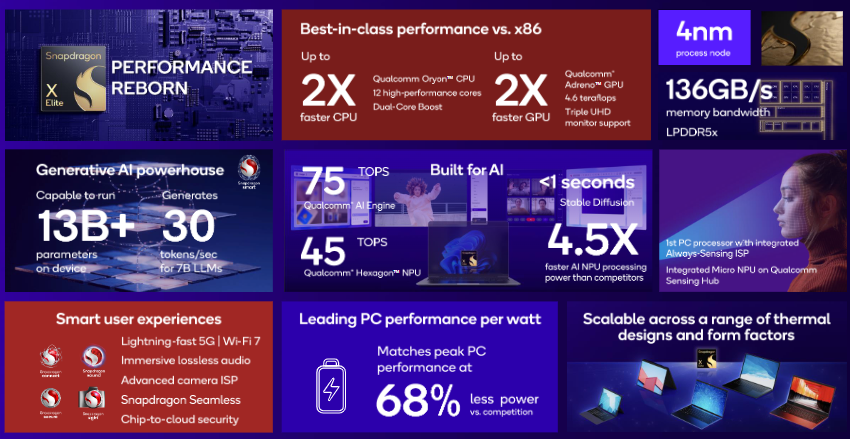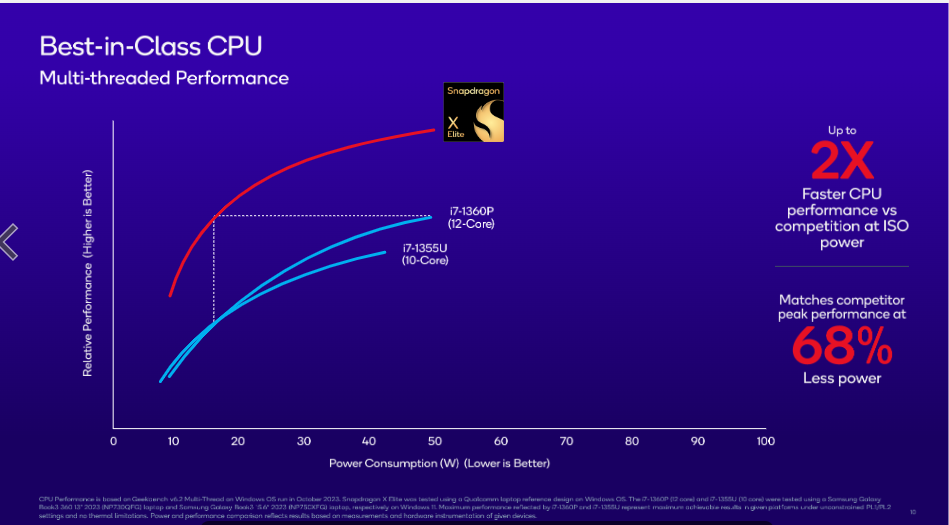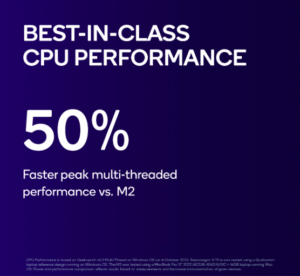Qualcomm joins Intel and Apple in PC chip race, with Nvidia and AMD in the running

- Qualcomm said its PC chip is prepared to compete head-to-head with Intel, AMD, and Apple regarding performance and efficiency.
- The Snapdragon X Elite is the first product from Qualcomm that integrates the Oryon CPU cores designed by the team acquired through the purchase of Nuvia in 2021.
“There is a new sheriff in town,” Cristiano Amon, the CEO of Qualcomm, told a reporter on Tuesday’s sidelines of the Snapdragon Summit. Amon was referring to his company’s thrust into the PC chip market, which, up until now, has been predominantly dominated by Intel, AMD, or Apple. Qualcomm, a company primarily known for its phone chips, is confident it will soon become a significant player in the computer processor space.
Qualcomm is touting a significant performance upgrade for its latest PC chip, the Snapdragon X Elite, which combines the Oryon CPU, a graphics processing unit (GPU), and a neural processing unit (NPU) designed for artificial intelligence. It appears like Qualcomm is trying to imitate, if not outdo, Apple’s M series of computer processors. The company is, in fact, confident it is poised to bring significant enhancements to Windows-based devices.
How are @Snapdragon compute platforms unlocking the potential of generative #AI on @Windows PCs? Qualcomm’s @cristianoamon and @Microsoft’s @satyanadella spoke about that and more at #SnapdragonSummit: pic.twitter.com/eUp0svGuOg
— Qualcomm (@Qualcomm) October 24, 2023
When Apple unveiled its new Mac computers in 2020, it also marked the end of a 15-year run where Intel processors powered Apple’s laptops and desktops. It was a significant shift for the semiconductor industry and became a transition that occurred even more rapidly than most had anticipated. As Apple completes a two-year transition away from Intel processors this year, Qualcomm, another semiconductor giant, decides to join the race.
Creating a three-way rivalry, the upcoming market dynamics could only mean one thing: the long-standing dominance of x86 and Intel in the PC chip market will be challenged further. Frankly, Qualcomm has had a long-running endeavor to penetrate the personal computer market.
That is why Amon boldly claimed that the new laptop processor was explicitly engineered to surpass competing offerings from Intel and Apple. In context, when Apple unveiled its first in-house silicon, it put to bed years of Intel’s status quo, and the transition occurred even more rapidly than most had anticipated.
Now, with Qualcomm introducing a processor that, according to the company, surpasses the speed of the fastest laptop chips produced by Apple and Intel, the rivalry among all three players will result in an increasingly competitive market for computer processors.
Qualcomm’s press release stated that “The Snapdragon® X Elite platform features the custom integrated Qualcomm Oryon™ CPU – the new CPU leader in mobile computing – and delivers up to two times faster CPU performance versus the competition, matching competitor peak performance with one-third of the power.”

Snapdragon X Elite’s performance. Source: Qualcomm
Unveiled at Qualcomm’s Snapdragon Summit, the company dubbed the Snapdragon X Elite: “the most powerful computing processor it has ever created for the PC.” “It would usher in a new era of premium computing by delivering a massive leap forward with best-in-class CPU performance, leading on-device AI inferencing, and one of the most efficient processors in a PC with up to multiple days of battery life,” Qualcomm highlighted.
Everything about the most powerful PC chip ever created by Qualcomm
The latest chip marks a significant improvement over the company’s previous attempts in the PC market, which faced issues like sluggish performance and limited Windows compatibility. As a result of the US$1.4 billion Nuvia acquisition, the Snapdragon Elite X was initially slated for a 2023 release but is now set for availability next year.
Supporting Amon’s, “There’s a new sheriff in town” quote is news that the Snapdragon X Elite outpaces the fastest chips from Apple and Intel on a specific benchmark for single-threaded CPU performance. The Elite X uses a 12-core Oryon CPU running at 3.8 GHz. Qualcomm says it can locally run AI models with up to 13 billion parameters without relying on AI processing in the cloud.

Lenovo and HP are among the PC makers promising to debut devices running the new chip. Compared with Apple’s M2 Max, Amon claims that Qualcomm’s chip can achieve comparable performance while consuming 30% less energy. He also said Qualcomm looks to wow the industry with far speedier performance with the new chip that can run 50% faster at peak times than Apple’s M2.

Snapdragon X Elite vs Apple M2. Source: Qualcomm
Likewise, Amon asserts that Qualcomm’s chip can rival the performance of Intel’s fastest laptop chip while using almost 70% less power. It is, however, necessary to note that Qualcomm is making performance comparisons between its forthcoming product and the currently available chips from Apple and Intel. It is essential to note that the competitive landscape is dynamic, and there’s a strong likelihood that developments will continue in this space.
Until now, only Apple’s proprietary designs have made substantial progress, eroding the dominance of the traditional standard by Intel. Apple’s share of industry shipments has recently exceeded 10%.
Qualcomm, Apple, Intel to be joined by Nvidia and AMD soon
Earlier this week, we reported on Nvidia and AMD’s intention to join the intensifying PC chip race, which will happen as early as 2025. In short, an Arm revolution should be coming to the PC market soon, with Nvidia planning to launch CPUs based on the architecture explicitly designed to run Windows, while AMD also plans to go down the same route.
As it is, Intel has been under attack in a market it dominated since the 1980s. That company, still one of the world’s largest chipmakers, has been trying to regain its footing with a massive investment in new technology under CEO Pat Gelsinger. While the news on Nvidia’s intention is not yet confirmed, the company, which already dominates the AI, HPC, and consumer graphics card industries, reportedly plans to expand its portfolio to include Arm-based processors for client Windows PCs.
The move is triggered by Microsoft’s encouragement for others to enter the Arm-based systems market once the former’s current exclusivity deal with Qualcomm ends next year. In 2016, Microsoft chose the company to bring the whole Windows experience to Arm-powered devices. While Nvidia and AMD’s foray into the PC chip space will not happen for the next two years, it will be interesting to see how the rivalry between Qualcomm, Apple, and Intel will turn out.










